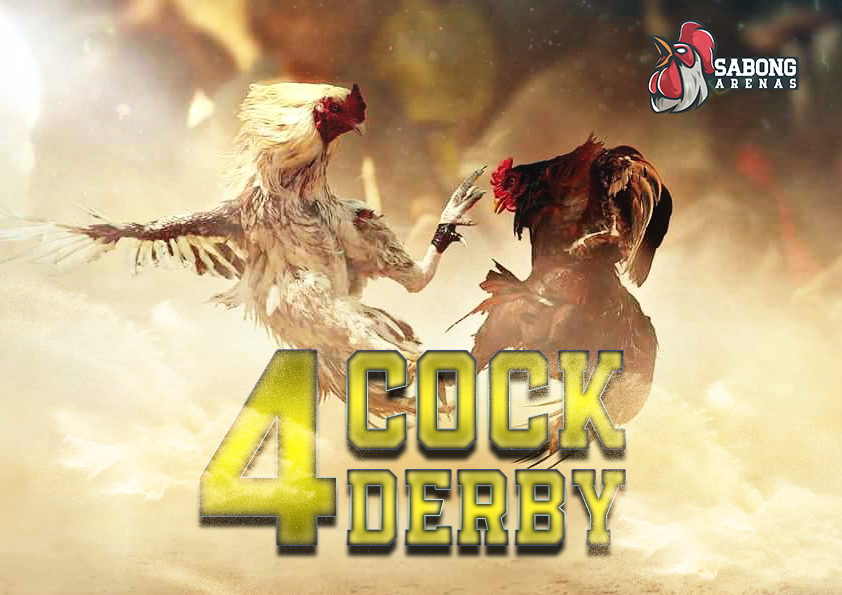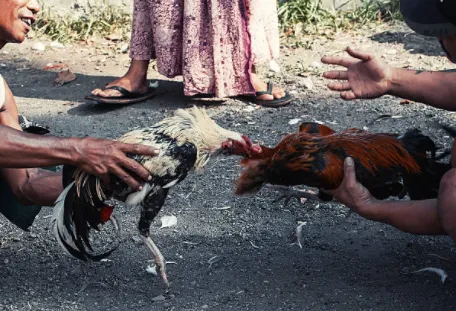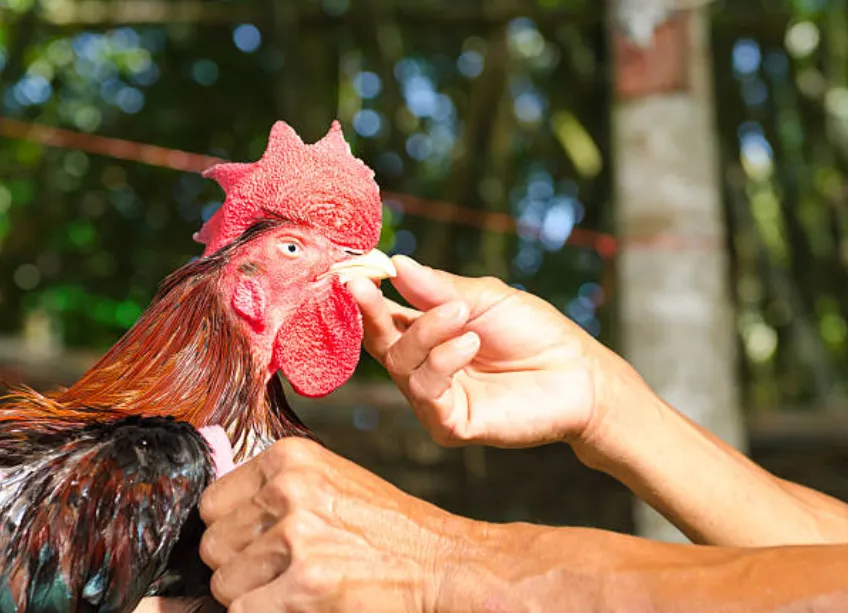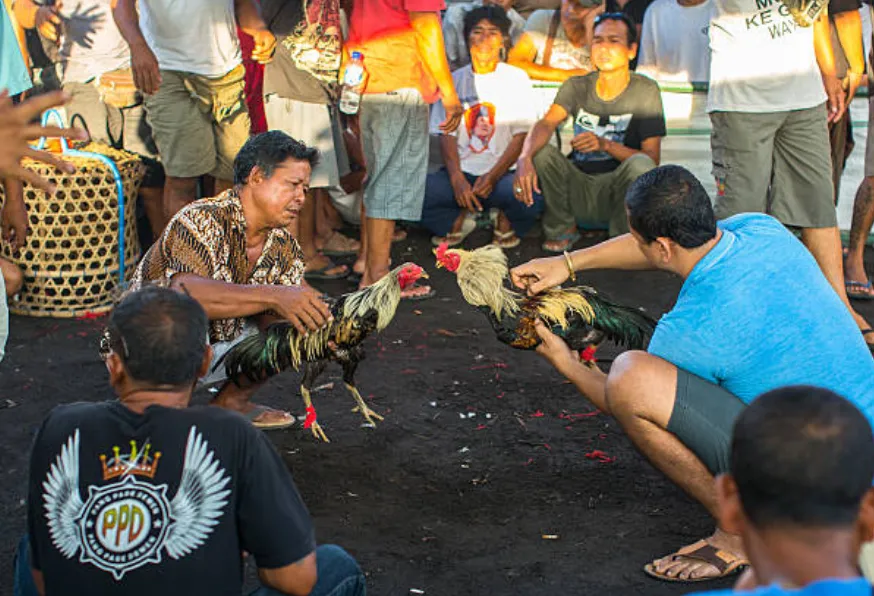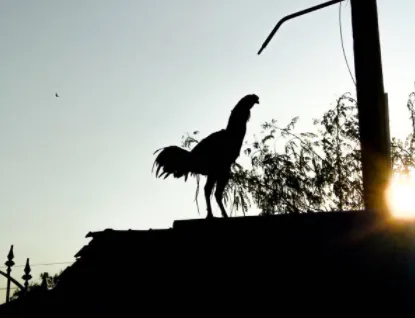Cockpit visit instills lessons in politics for young observer (Sabong Arena)
Genre
Sabong Arena
Keywords
Sabong Tambayan Talks
Article ID
00000462
THE sounds emanating from a cockpit in Batangas brought a sense of haste to Edgardo Manalo and Reynaldo Perez.
Manalo, 56, absent-mindedly fingers the yellow P500 bill in the right pocket of his jeans, worn out and tattered from years of working in construction sites. Perez, 34, notices Manalo’s mannerism and pulls out five P100 bills, crumpled from being handled by strangers’ hands.
Their money represented a day’s labor in a construction site two days ago.
Their shadows disappear as they enter the cockpit. They pay the full P100 entrance fee to a man manning the till since they didn’t bring a rooster to register in the game, which could have cut the fee to half.
Their bodies are immediately hit by the heat and the sound of about 5,000 men shouting all at the same time. It’s a Sunday and, hence, the cockpit is full.
According to Manalo, a short man with shoulders bulging with muscles, the owner invites many cock breeders from different towns. Hence, the wooden rafters are filled to the brim.
Perez, a tall bald man with prominent cheekbone and a sunny aura, leads Manalo towards the far right corner from the entrance. He walks, broad shoulders swaying as if patrolling a turf, to a spot five meters away from the ring.
THEY have a distant view of the arena but Manalo said, in a Batangueno accent that seems to taunt a fight, it has always been their spot.
They walk past men wearing gold rings and gold chain necklaces—some say they’re fake, some say they’re real—sitting on the first row. Perez leans towards his friend and, pointing to the first row, tells him in Tagalog: “Mark my words, one day we will be sitting there.”
The first row of the arena is reserved for big-time gamblers and cockfight aficionados. Their seats are cushioned and only a few inches away from the glass-paneled ring. It’s also the most ventilated spot in the cockpit.
Manalo and Perez dissolve in a pool of men who, like them, have skins grew dark after working long hours under a scorching sun. Nearly blocking their view is a man with a round belly jutting out from an undersized blue t-shirt that, like the white towel draped on his right shoulder, is damp with sweat.
Manalo arches his furrowed brows, making the three deep lines chiseled on his forehead more pronounced, as he checks the crowd he believes is composed of jeepney or tricycle drivers, stevedores or farmers.
AFTER a brief survey, Perez whistles and receives a glance from a “Kristo,” the bet-collector standing inside the pit; a middle-aged man with linear physique and keen eyes. His voice is hoarse and raspy. Perez said they are called “Kristo” because they always have their arms spread while trumpeting the bets, thus resembling the statue of Jesus Christ in Rio de Janeiro, Brazil.
Manalo said cockfighting is “laro ng maginoo” or a gentleman’s game.
“If you say you have P1,000, you better have the money to pay back if you lose,” he said in Tagalog. “Bets are cast man to man and payback of the wager is only given after every game. You have to trust the other person has the money and be gentleman enough to bet only on the length of your limb.”
Perez cast his stakes early on. It’s the 53rd “sultada” (game of the day) and he bets on what they call a “mayahin,” or a dark-legged rooster. Manalo’s eyes sweep the cocks lined up before his gaze paused on the ‘mananari’ (the gaffers attaching the blade at a cock’s leg) and resuming on the one fighting cock he believes would be a sure winner.
A minute before the match, the cockpit dissolves into indistinct chatter.
The Kristos extend their arms to get the bets, shouting “Meron! Wala!, “Posyam!” and “Lodyes!”
“Meron! Wala!” is a wager that refers to equal bets. One will gain P 1,000 if one wins or pay back P1,000 if one loses.
“Po’siyam!” is a wager of “sampu-siyam.” One gains P1,000 for a win but pays back P900 for a loss. For a “lodyes,” one gains P1,250 for a win but pays back 1,000 for a loss.
Everyone is signaling to someone, bargaining with each other before nodding their heads in agreement on the bet. Everyone is shouting; filling the cockpit with noise that, surprisingly, doesn’t descend into chaos.
Each fight lasts from 10 seconds to 15 seconds. But in that short time, the anxiety level intensifies as the stakes are high. Eyes are glued on the ring; faces of hardened men painted with worry with some growing pale or flushed as cocks exchange kicks. The man in front of Manalo and Perez stands every time the cock he bet on delivers a blow but sits again when the opponent lands one.
After each “sultada,” the tension dies down as quickly as it rose after a cock is declared dead or dying; to be thrown on a pile of losers.
AS time passes by, the air inside turns hazy and sticky. The place is wrapped by the smell of sweat, warm breath and metallic smell of blood from the dead or dying cocks.
An announcer calls for a break after half of the scheduled fights are accomplished. Politicians making rounds in town walk inside the ring, each arrival announced over loudspeakers, which also play respective campaign jingles.
People like Manalo and Perez count their winnings or losses, oblivious to the parade of politicians spilling promises. One after the other, the congresswoman running for the 4th District of Batangas together with the town candidates introduced themselves and enumerated their plans. But, the men just took a quick look and sit down again. None of them really paid attention.
Like other bettors, they weigh whether to stay and try their luck in the other fights or go home. Some troop to the exit, either keeping their streak of luck for the next “sabong” or rejecting the chance of leaving with nary a centavo for fare.
FROM P500, Perez now had P3,000 while Manalo, P2,500. Pleased with their earnings, they were able to breathe easy and head for the exit. A politician continued to sell her image as pro-development, pro-poor and pro-change leader.
Perez said he might just be able to bring home a kilo of beef for stew at dinner. Manalo said he now has money to pay for his eldest son’s graduation fee.
But a gambler is a gambler: the two men returns to their spot inside the cockpit.
“Kagaya kasi manok, tandang eh mahirap sadya gang parang isang kahig isang tuka, totoong pasasalamat na la’ang at may sabong,” Manalo said. [Like the cocks, the chickens, we scrape by for a living. We’re thankful there’re cockfights.]
For fathers like Manalo and Perez, a cockfight is an alternative source of livelihood to make ends meet. Placing their bets has always been a careful estimate; seldom for fun or entertainment. In every game, there’s always a silent prayer to win because their din of thought is to provide for the family.
ROOSTERS crow in the first light of dawn and men like Manalo and Perez get up early in the morning. Roosters scratch the ground all day while Manalo and Perez risk breaking their backs carrying sacks of gravel and cement from daylight to dusk. After seeing their calloused hands and weary shoulders from everyday toil, no one can say they’re lazy.
The truth is, there’s just really never enough money for us to get by, Manalo said.
They’re thankful they have jobs in the construction but they said it’s only good until the end of summer. They’re not gainfully employed and they have no job security so they have no choice but to rely on immediate source of money.
Inside the cockpit, they’re convinced there’s a “Kristo” that can save them.
“Mantakin mo’t basa na sa pawis ang iyong brief sa paghahalo ng semento bago’y P500 lang makukuha mo sa maghapon. Eh dito sa simburyo mabilis laang,” Perez said. [Imagine your underwear is soaked in sweat mixing cement all day only to get P500. Here in the cockpit, you earn money faster.]
After the break, all the remaining matches finished in a matter of minutes. It’s a tiring 15 second-cycle of chatter, nervous whispers and betting on cocks. In the end, Manalo stopped after P1,800 in earnings while Perez was unfortunately left with only P400.
IT’S past eight in the evening and two men exit the cockpit for a ride back home. They’re waiting in a nearby shed, which was adorned with posters of vote-seekers.
Two men entered and left the cockpit at the same time but anyone can tell only one is eager to get home.
Perez leans on the lone lamppost, which wraps him and a portion of the road near the bus stop in dim yellow. He absent-mindedly fingers the cash in the right pocket of his jeans, which is now almost white with daily use. He shakes his head, maybe cursing himself for that last bet that saw his winnings disappear.
However, Perez said he will return to the cockpit to attempt to recoup the money he lost. Perhaps, he will finally be able to bring home a kilo of meat.
The sad truth is, their uncertain faith on the cockpit appeals more real than the dashing promises any politician could give them.

